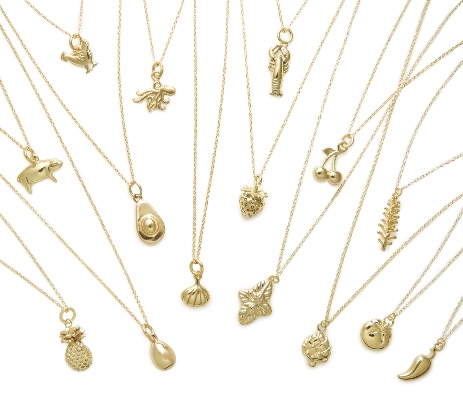BY BETH WEITZMAN
From delicate dumplings to gleaming forks, food jewelry is reshaping how we celebrate our love for food. Brands like Delicacies Jewelry and MIMOSA Handcrafted go beyond style, blending sustainability with philanthropy. These playful collections are more than fashion — they’re symbols of positive change, feeding communities and championing eco-conscious craftsmanship.
Jewelry that looks like food may seem whimsical, but for Delicacies Jewelry, each piece carries deeper meaning.
“The idea for Delicacies came to me in a hallucination from Dengue Fever,” shares Nicolle Nelson, co-founder and designer of Delicacies Jewelry. “I saw a tiny, elegant head of garlic, shining brightly, fastened around my wrist.” That vision turned into a brand blending food- inspired designs with a mission of giving back. Since 2015, Delicacies Jewelry has crafted pieces like pasta, dumplings, avocados, and doughnuts, resonating with those who hold a deep connection to their favorite foods.
“Food jewelry isn’t for everyone,” Nicolle notes, “but if you give someone an avocado necklace because it’s their favorite food, you’ll frequently hear it was the ‘perfect’ gift.”
Delicacies Jewelry is more than just a fashion statement — it’s a brand with a purpose. Since its inception, the company has donated over one million meals. “We hit our initial goal in September 2024, nearly nine years after we launched,” Nicolle proudly shares. The company donates 10% of all profits to hunger- relief organizations, partnering with nonprofits like Loaves & Fishes in Minnesota and Renacer del Mayab in Mérida, Mexico.
“From day one, giving back was baked into Delicacies Jewelry,” she explains. “Living in Mexico, we set two goals: to show our daughter that two people can make a difference and to donate a million meals.”
The brand’s Chef’s Collaborations initiative partners with top chefs like Marcus Samuelsson, Dominique Crenn, Carla Hall, Kristen Kish, and Christina Tosi, founder of MILK BAR. For each collaboration, Delicacies donates to a chef-chosen charity, blending culinary designs with a commitment to fighting hunger.
“Chefs are enormously generous, and we’ve been lucky to work with some very prominent people,” she notes.
Delicacies Jewelry is equally committed to sustainability, sourcing recycled metals wherever possible and using eco-friendly packaging, like the small Mason jars their pieces come in. Customers often repurpose the jars for storing honey, salt, or even planting seeds, adding another layer of sustainability to their approach.
Similarly, MIMOSA Handcrafted approaches food jewelry with both heart and sustainability in mind. “At MIMOSA, we believe that jewelry should tell a story and celebrate life’s meaningful moments,” says Madeline Ellis, the company’s founder and creative director.
Culinary-themed pieces, such as the Cajun Holy Trinity, cutlery charms, artichokes, and pecans, reflect the deep connection between food, family, and Southern traditions.
“Food, especially in the South, brings people together. We gather around food to mark celebrations, milestones, loss, and, of course, meals are woven through the everyday [moments] that add up to make our lives,” explains Madeline.
What truly sets MIMOSA Handcrafted apart is its unwavering commitment to eco-friendly practices. The company prioritizes using recycled metals, including 100% recycled 14K gold (SCS Recycled Content Certified), and portions of recycled sterling silver and bronze, incorporating in-house metal scraps and broken or unsuccessfully cast pieces into new designs. All of their jewelry is crafted using the ancient art of lost wax casting, allowing them to create intricate and detailed pieces.

“Sustainability means being intentional about reducing waste, conserving resources, and producing responsibly,” explains Madeline.
Despite challenges like fluctuating prices and inconsistent material quality, MIMOSA maintains its high standards by sourcing from trusted suppliers who ensure ethically and sustainably reclaimed materials.
“The main challenge has been sourcing recycled metals at a price that keeps our pieces accessible to a broader market,” Madeline says.
A recent move to a new facility has helped the company to streamline production, making it more energy-efficient and further reducing waste.
Their commitment to sustainability extends beyond production practices. Through their #goodsforgood initiative, MIMOSA aligns specific pieces with charitable causes, turning their jewelry into a tool for positive change.
“Many of our culinary-inspired pieces have gone from a symbol of personal meaning to a tool for positive impact,” Madeline notes. By focusing on both sustainability and philanthropy, MIMOSA Handcrafted goes beyond jewelry to foster meaningful, lasting connections that benefit their customers and the world around them.
Check out our expanded list of food-inspired gems from eco-conscious jewelry brands on our website: www.greenlivingmag.com/culinary-inspired-jewelry-that-looks-good-and-does-good.






